Looking back on your life, when have you done good work by organising your time in blocks? You may have taken this step when studying for an exam, writing an article, tackling a complex problem or doing a project.
What did you do to organise your time and then perform good work? You may have planned ahead, prepared properly and got the resources in place. You may then have thrown yourself into the task, concentrated fully and done satisfying work.
If you wish, try tackling the exercise on this theme. This invites you to do the following things.
Describe a specific situation in the past when you organised your time in blocks and did good work during these times.
Describe the specific things you did to take these steps.
Describe the specific things that happened as a result of taking these steps.
Creative artists often organise their time in blocks. This enables them to prepare properly, pursue their individual rituals and immerse themselves in their chosen task. They are then able to flow, focus and finish.
Creating Blocks Of
Time During The Day
The creative artist’s approach sounds ideal, but not everybody has these opportunities. For many people it can be difficult to concentrate during a day. One senior manager expressed this in the following way.
“Sometimes my whole day gets blown to pieces. As soon as I get into the office I am inundated with requests. Despite having good intentions, my own agenda goes out of the window.
“It doesn’t help that I sit on the end of a row in an open plan office. People are constantly interrupting and it takes ages to resettle back on the task I was doing.
“Recently I have read lots of articles on introverts and how they need space to reflect. Whilst many people would say I am an extrovert, I also need time and space to think.”
Different people like different conditions around them to do good work. Some like the buzz of other people talking and moving, whilst others prefer more solitude.
There is, however, one common denominator that characterises people who do good work – they like to feel in control.
Good workers organise their days so that they have time: a) to prepare properly; b) to perform properly. They are then more likely to be able to achieve peak performance.
This sounds simple, but taking this step can be challenging. The senior manager mentioned above chose to proactively manage their key stakeholders, their team’s outcomes and their customers.
Taking these steps freed up time to do more productive work during the day. Let’s explore how they made these things happen.
Step One – Managing
The Key Stakeholders
This proved to be the hardest part. Many of the key people they reported to took a keen interest in details, so it was important to put their minds at rest. The senior manager therefore did the following things.
They ensured their team delivered its part of the organisation’s scorecard.
They proactively kept their key stakeholders informed about the team’s progress towards delivering the scorecard.
They had ongoing meetings with the key stakeholders to clarify the potential challenges on the horizon and how their team could help these stakeholders to achieve success.
The senior manager was therefore able to get ahead of the game, rather than be surprised by new demands. Certainly there were still some interruptions, but taking these steps helped to manage the stakeholders.
Step Two – Managing
The Team’s Outcomes
The senior manager also needed their team to become more self-managing. They took the follow steps to make this happen.
They built a team of people who were positive, professional and wanted to achieve the team’s picture of success.
They made clear contracts with people about their parts in delivering the picture of success.
They focused on managing by outcomes, rather than by tasks, and enabled people to deliver the picture of success.
Taking these steps freed up more time for the senior manager to focus on shaping tomorrow’s business, rather than managing today’s business.
Step Three – Managing
The Customers
The senior manager played to their strengths by acting as a trusted advisor to certain kinds of customers. They took the follow steps to make this happen.
They re-established contact with key customers who they had worked with in the past, some of whom had moved on to new roles.
They acted as a trusted advisor to these people and this resulted in gaining more business for the organisation.
They spent more time blogging and doing keynote speeches that helped to establish the organisation as thought leaders.
The senior manager freed up time to do what they did best, but this still called for organising their day properly. They therefore got into the office early to make sure that, as far as possible, the day would run smoothly.
Wherever possible, they organised their day in blocks. This enabled them to do good quality work on, for example, helping customers to achieve their goals.
The main challenge continued to be managing their key stakeholders. But delivering the goods and reassuring these people created much more space to do fulfilling work.
Different people use different methods for organising their time. You will, of course, have your own approach to feeling more in control of your diary.
If you wish, try tackling the exercise on this theme. This invites you to do the following things.
Describe a specific situation in the future when you may want to organise your time in blocks and do good work during these times.
Describe the specific things you can do to take these steps.
Describe the specific things that may happen as a result of taking these steps.


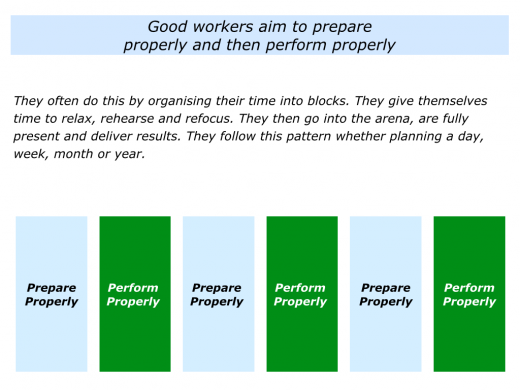
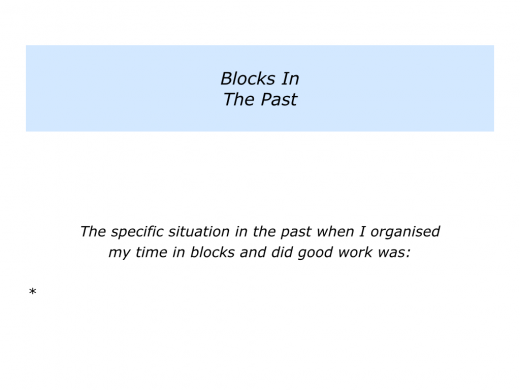
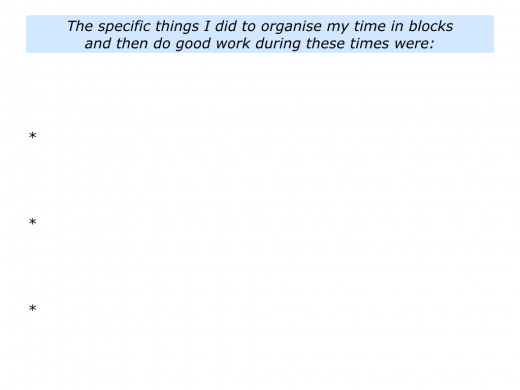
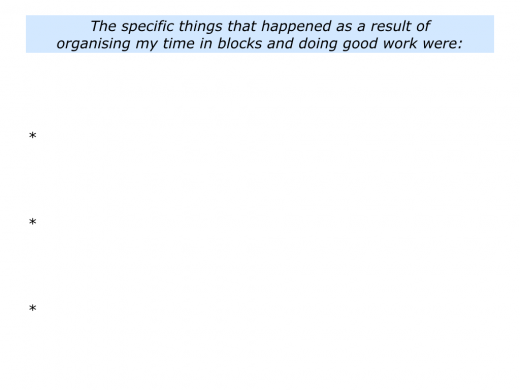
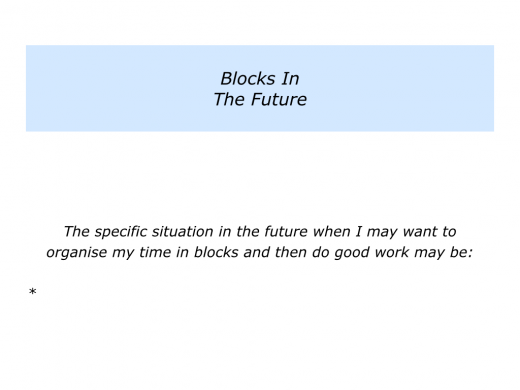
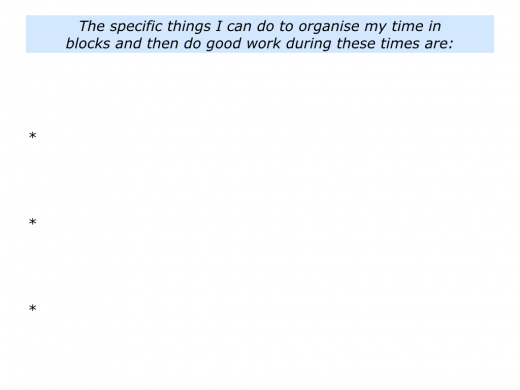
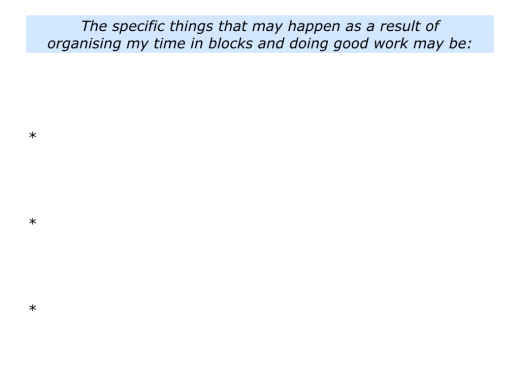




Leave a Reply